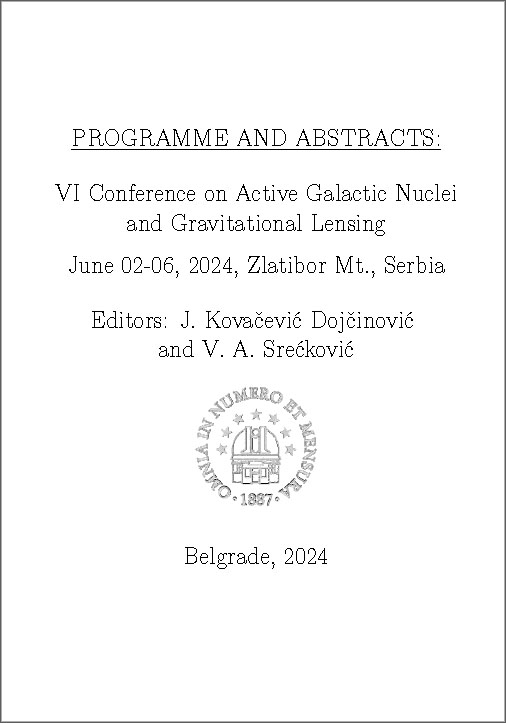Publication
PROGRAMME AND ABSTRACTS: VI Conference on Active Galactic
Nuclei and Gravitational Lensing, June 02-06, 2024, Zlatibor Mt.,
Serbia. Editors: J. Kovačević Dojčinović and V. A. Srećković
Nuclei and Gravitational Lensing, June 02-06, 2024, Zlatibor Mt.,
Serbia. Editors: J. Kovačević Dojčinović and V. A. Srećković
Autors
V. Petrecca, I. E. Papadakis, M. Paolillo, D. De Cicco and F. E. Bauer
Title
ENSEMBLE POWER SPECTRAL DENSITY OF QUASARS IN UV/OPTICAL BANDS
Abstract
Variability of AGN has proven to be a powerful tool to constrain the properties of the accretion process onto supermassive black holes and their surroundings. Correlations between UV/optical variability and physical properties have been long studied with a plethora of different approaches and time-domain surveys, although the detailed interplay between different emitting regions is not yet clear. Upcoming surveys such as the Legacy Survey of Space and Time (LSST) will revolutionize time domain astronomy by increasing both the size of the sample and the temporal baseline.
I present a completely model independent study of quasar optical variability through ensemble power spectral density (PSD) of archival data collected from different surveys and reaching LSST-like temporal coverage. Variability does not depend on redshift, while both PSD amplitude and slope depend on black hole mass, accretion rate and rest-frame wavelength. There is also evidence for a universal PSD shape for all quasars, where frequencies scale with black hole mass while normalization and slopes are fixed, at any given wavelength and accretion rate. The proposed framework can show the potential LSST capabilities and can be applied to the upcoming data, shedding lighton the accretion mechanism of AGN.
I present a completely model independent study of quasar optical variability through ensemble power spectral density (PSD) of archival data collected from different surveys and reaching LSST-like temporal coverage. Variability does not depend on redshift, while both PSD amplitude and slope depend on black hole mass, accretion rate and rest-frame wavelength. There is also evidence for a universal PSD shape for all quasars, where frequencies scale with black hole mass while normalization and slopes are fixed, at any given wavelength and accretion rate. The proposed framework can show the potential LSST capabilities and can be applied to the upcoming data, shedding lighton the accretion mechanism of AGN.




